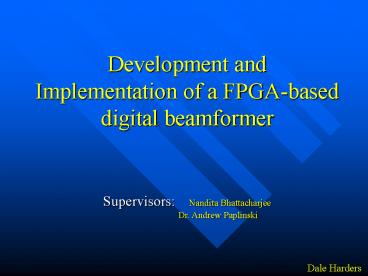Development and Implementation of a FPGA-based digital beamformer - PowerPoint PPT Presentation
1 / 16
Title:
Development and Implementation of a FPGA-based digital beamformer
Description:
Focussing subsystem. Electronic vs. Mechanical. Sharper images are produced ... How is this focussing achieved digitally? Beamforming Fundamentals ... – PowerPoint PPT presentation
Number of Views:218
Avg rating:3.0/5.0
Title: Development and Implementation of a FPGA-based digital beamformer
1
Development and Implementation of a FPGA-based
digital beamformer Supervisors Nandita
Bhattacharjee Dr.
Andrew Paplinski
Dale Harders
2
- Presentation Outline
- An Ultrasonic Imaging System Overview
- Beamforming Fundamentals
- Significance of study
- Simulator role within this project
- Implementation
Dale Harders
3
Ultrasonic Imaging System Overview
Dale Harders
4
Beamforming Fundamentals
What is a beamformer?
- Spatial Filter
- Only extract desired directional data
- Remaining signals are attenuated
- Focussing subsystem
- Electronic vs. Mechanical
- Sharper images are produced
Dale Harders
5
Beamforming Fundamentals
How is this focussing achieved digitally?
Consider how an ultrasonic imaging system
operates
Dale Harders
6
Beamforming Fundamentals
Possible Solution Delay in time
Disadvantages Large storage requirements
High clock rates required for fine delays
Dale Harders
7
Beamforming Fundamentals
Better Solution Phase-shift via complex vector
rotation
- A rotation of complex data in the frequency
domain is equivalent to a time delay in the time
domain.
- Process data in a different Domain
- requires Quadrature sampling (Re, Im)
Advantages Relatively small digital circuitry
required Lower sampling rates required
Dale Harders
8
Significance of Study
Ultimate Goals
- Increase Image Resolution
- - Improve Signal-to-noise ratio
- Maintain fast frame-rates
- - Real-time imaging
- Develop 3D-imaging techniques
- Continuation of Previous Research _at_ Monash
- (Hampson G, 1998), (Bhattacharjee et al, 2000)
- (Prain R, 2001)
Dale Harders
9
Simulator role within this project
Field II
(Jensen, 1996)
- Ultrasound simulation program
- Developed by Joergen Jensen, Denmark
- Running under Matlab
- Capable of emulating all sub-systems
Dale Harders
10
Simulator role within this project
Field II Example
Dale Harders
11
Simulator role within this project
Field II Example
Dale Harders
12
Simulator role within this project
Field II Example
Dale Harders
Dale Harders
13
Implementation
- Hardware system
- Two word-parallel, fully pipelined, CORDIC vector
rotators operating in parallel - Summing performed on chip
- Design implemented on a Xilinx Spartan II FPGA
- Device Driver
- Interfaced PCI communications API to Matlab
Developed System - Block Schematic Next Slide
Dale Harders
Dale Harders
14
Beamformer System
ACCUMULATOR
15
Conclusion
- Stable Development Platform built
- Easy to use interface for new design
test-benching
- Project deliverables satisfied
- Successfully implemented a hardware digital
beamformer
- PCI communications
- Developed a PCI communications interface between
Matlab and the Hardware for design verification
and future development acceleration
Dale Harders
Dale Harders
16
References Bhattacharjee N, Paplinski A and
Hampson G, "Phase-shift Beamforming", TR
2000/53, CSSE , Monash University, Clayton,
2000 Hampson G.A, "Implementing
Multi-Dimensional Digital Hardware
Beamformers", PhD thesis, Faculty of Computing
and Information Technology. Monash University,
Clayton, 1998. Jensen J.A, "Field A
program for simulating ultrasound systems", 10th
Nordic-Baltic Conference on Biomedical
Imaging, vol 4, pg 351-353, 1996. Prain R,
Parallel CORDIC implementation for hardware
beamformers, Honours Thesis, Department of
CSSE, Monash University, Clayton, 2001.
Dale Harders































